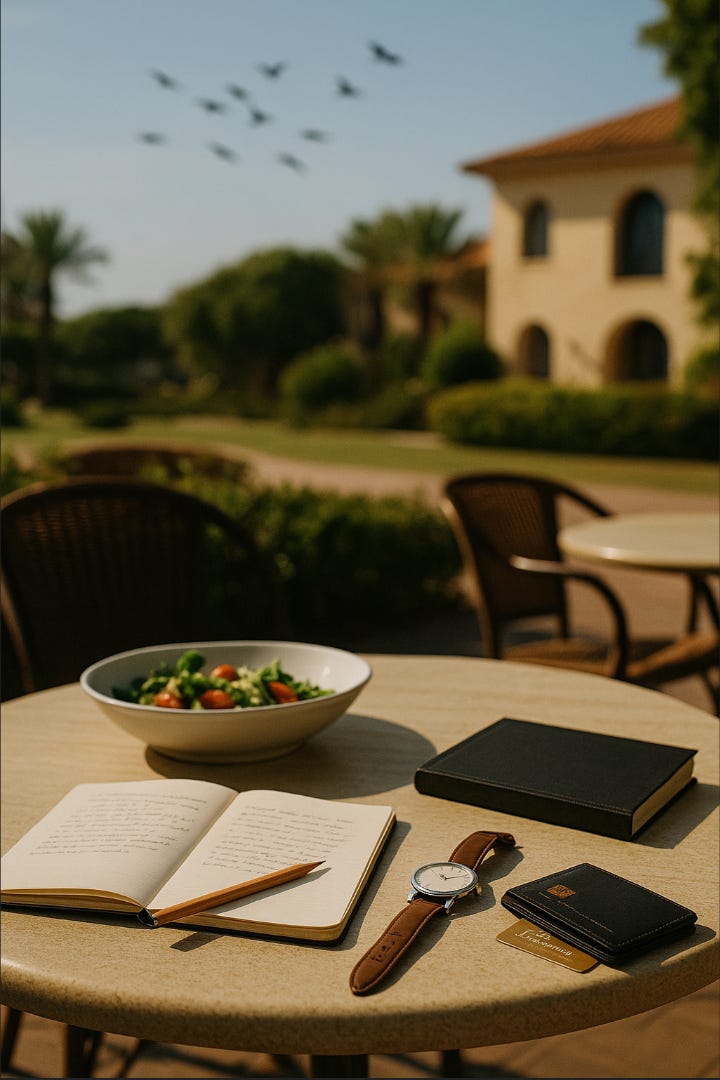How It Feels to Be Offline for a Day
Spoiler: we survived. But there was a bird detective, no watch, and a bill we couldn’t pay.
We asked for the bill. The waiter came smiling. We reached for our pockets and realized we had no way to pay.
No phones. No wallets. Just two people blinking at each other and laughing nervously. We’re so used to paying with Apple Pay, we didn’t think about this small detail when we left our phones in the room that morning. It turned out to be just one of several small incidents from the day we decided to go completely screen-free.
We’d been talking about doing a full offline day for a while. But on a regular day at home, it felt… unrealistic. Too many reasons to need the phone at reach.But we were away on a long weekend break, and that felt like the perfect time to try.
By the end of the day, we both wanted to do it again. But we also learned just how deeply phones are stitched into the fabric of our lives, in ways we hadn’t fully noticed before.
But what I also realized is that I’m not as dependent on my phone as I thought. I expected withdrawal. I thought I’d fidget or reach for it unconsciously. But… nothing. I didn’t miss it.
What I did miss, surprisingly, was the time. I hadn’t realized how many times a day I check it. Not actively, but passively, through a glance at the screen, a phone, a laptop, a microwave. The modern world is saturated with clocks. When that’s taken away, you notice. I found myself disoriented a few times, and realized: if I do this again, I need a watch.
There was one thing that popped up a few times during the day, a low hum in the back of my mind: What if someone from my family needs something? We don’t talk every day, but the thought still crept in. That little thread of worry, not overwhelming, just… present.
At lunch, we had a great salad. Normally I’d snap a photo to remember it. But this time, with no phone, I just stared at the plate and repeated the ingredients to myself like a spell I didn’t want to forget. And guess what? A week later, I recreated the salad from memory. Which is funny, because I have dozens of food photos I’ve never looked at again, but somehow, the act of really looking helped it stick. There’s something about making an effort to remember that makes the memory stay.
Later, my partner noticed a huge number of a particular bird species flying around the pool. We’d been there three days and hadn’t noticed. He asked me what kind of bird it was. I had no idea. No Google. No ChatGPT. So he walked off and talked to the hotel staff until he found out: it’s a protected species. And in the process, he came back with three other stories, all from that one little mission. A question, a walk, a few conversations, and we suddenly knew more about the place than in the previous three days combined.
With nothing to do in the in-between moments, I either read or people-watched. By the end of the day, I’d finished my book. We also had a full mental map of the families staying at the hotel, their dynamics, nationalities, quirks. Not because we were being nosy. Just… present. On previous days, none of that registered.
At the gym, I usually use my phone for music, checking videos, logging workouts. That day, I brought pen and paper instead. For the rest, I interrupted my partner a lot: asking for help, guidance, feedback. He actually liked it. Since then, we’ve been trying to train at the same time, more often.
So, did it radically change our lives? No. Was it incredibly difficult? Not really. But it did change the texture of the day. We noticed more. Talked more. And most interestingly, we ended the day feeling calmer. It was as if our brains hadn’t been running at full bandwidth all day. And maybe that’s part of the tiredness we feel without realizing. The constant, subtle drain of a hundred pings and scrolls.
Ah, and the bill? We just walked back, got our wallets, and spent the rest of the day with old-school plastic cards in our pockets.


